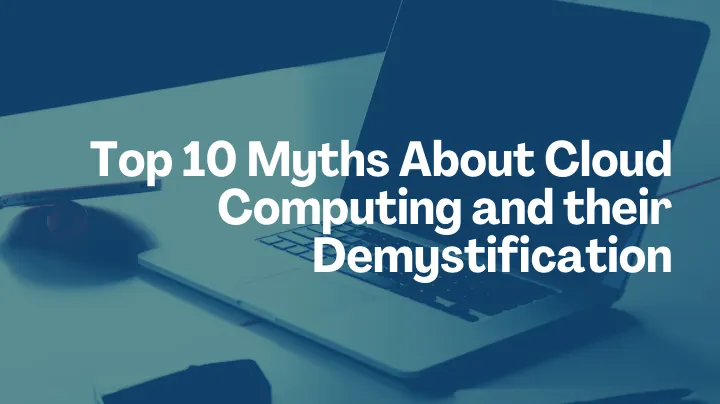
With so much growth and potential expected in 2021, it is finally time to refute some of the most intriguing myths about cloud computing. Here are the top 10 myths compiled from the questions and concerns raised by global developers.
1. Is Cloud Computing Only for Tech Companies?
Cloud computing is for everybody. Gartner says that 87 percent of senior business leaders prioritize electronic as a key initiative in their own organization. Cloud computing is central to a digital-friendly business and contains more takers from each sector. It isn't just big corporations or large companies that benefit from cloud computing. If you are updating your social networking profile or checking your bank statement online, you are using a program hosted on the cloud. The majority of these applications that we use everyday are accessed through an internet connection.
2. Will Cloud Computing Reduce IT Jobs In-House?
Like any emerging technologies, cloud computing systems will generate opportunities for present technologies people to upskill and transition their experience to some other dimension. There'll be an increase in demand for those who have cloud abilities in the forthcoming years as more companies become a tech-driven business.
3. Is Cloud Computing Feasible for a Small Business?
82 percent of small companies reported extensive cost savings when going into the cloud. In the aftermath of this 2020 pandemic season, many tiny companies could stay competitive only due to their electronic supremacy backed by an inherent cloud infrastructure. SMBs have reported substantial progress in productivity and endurance.
4. Will Cloud Computing Reduce My IT Costs Significantly, as Claimed?
The amounts in price that cloud computing may save to get a business have to be analyzed from a long-term standpoint. Cloud computing can save yourself a significantly large proportion of operational price with optimization through recent years. As an instance, leading picture and photo-sharing stage SmugMug reduced operating costs by approximately 40 percent with AWS's EC2 A1 cases. Samsung's technology wing reported almost 20 percent savings on going to AWS for managing their EPC layout and data management.
5. Will My Data Be Secure on the Cloud?
In the first days of cloud, safety was a significant question. But now's cloud solutions have improved hugely and today deploy the latest firewalls and AI-based smart security monitoring for extra assurance. Cloud security includes the extra advantages of innovation and market analysis accomplished by means of a cloud supplier, thereby guaranteeing information protection. It's much better than picking an in-house hosting to the technology stack.
6. Can I Use the Cloud for Mission-Critical Applications?
In 2019, the US Pentagon granted a USD 10 Billion contract to Microsoft Azure to transfer crucial defense applications into a safe cloud atmosphere. Cerner, among the world's biggest health care ERP suppliers, utilizes AWS to develop vital clinical data management solutions that physicians rely on to save the lives of countless individuals every day. These are just two striking examples to demonstrate that the cloud is a trusted alternative for any mission-critical support.
7. Will Migrating to the Cloud Cause Extended Downtime?
Contemporary technology structure such as microservices combined with newer installation and DevOps techniques guarantee businesses of near-zero downtime whilst adapting their business services into the cloud. When societal media giants such as Facebook update their network or introduce new services, we barely notice any downtime of the systems operating in the cloud. Similar are the situation for any cloud support.
8. Will I Have Less Control Over My IT While Moving to a Cloud Service Provider?
Contemporary cloud providers function on client's conditions, and there are not any digital lock-ins from the supplier. A company which moves into the cloud may have complete flexibility to handle its software, information, and policies and also will scale up or down its own cloud use on its provisions.
9. Is It Always Cheap to Run Services on the Cloud?
As stated in the last point, cloud computing starts to reveal its results in the long run. As more of your company's technology goes to cloud solutions, there will be considerable reductions in operational costs when compared to managing the infrastructure to run them within an on-premises setup. Running a few apps in-house may appear to be cheaper in the brief term, but as the business grows, more divisions will need access to IT resources, and this will raise the infrastructure cost required to maintain your in-house IT supportive of the increased demand.
10. Will My Organization Be Entirely Digitally Transformed by Moving to the Cloud?
Cloud computing is a basic pillar of electronic transformation. However, by simply moving your current technologies to the cloud does not guarantee an entire digital transformation encounter. You have to re-align business processes, workflows and introduce new electronic platforms operating around the cloud to each department in your organization to create a total transformation of your company along with your IT spends.
Regardless of your company's scale or functional domain name, cloud computing is going to be a worthy option. Now you have an answer to all those fascinating myths concerning cloud computing, there's nothing that prevents you from choosing another generation of venture cloud platform to market your company's expansion.
Cloud Computing Courses You May Like:
One To One Azure Cloud Training







